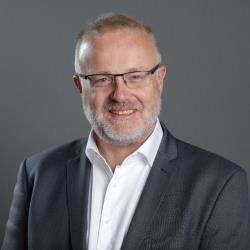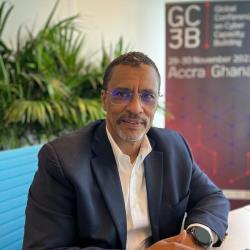AI and the Future of Cyber Capacity Building
Global Forum on Cyber Expertise
Session 162
Understanding the Opportunities, Risks, and Threats
Artificial Intelligence is changing the digital landscape, and nowhere more so than in relation to security and cyber capacity building. This session, which also serves as a meeting of the Global Forum on Cyber Expertise (GFCE) Working Group on Emerging Technologies, is an opportunity to delve more deeply into the opportunities, threats, and risks created by AI for those in the cyber capacity building space.
Key questions to drive the conversation include:
- What opportunities does AI create for improving cyber capacity and security? Are there examples already in play?
What risks are created or exacerbated by AI? How do cyber capacity building efforts need to evolve to address these risks? - Are the current approaches to cyber capacity building up to the challenge? Or do we need to look at new approaches or new kinds of collaboration?
- Are there specific groups or countries at greater risk from AI-enabled or AI-enhanced threats? Are there capacity gaps that may grow to be significant dangers in the future?
The session will feature interventions by speakers from governments, the private sector, and capacity building professionals. We look forward to an interactive session with those onsite and those joining remotely, and will reserve space for a broader discussion for all stakeholders.
**This page is still being updated**

Maarten Botterman is an independent strategic adviser on Internet governance and related issues with more than 25 years' experience in guiding governments and major organizations on the economic, business, and societal impacts of current and future Internet innovations and technologies. During those 25-plus years, he participated in and led more than 50 international projects and studies and published more than 80 peer-reviewed reports for governments and industry on Future Net issues with teams, including experts with advanced academic degrees from many disciplines, ranging from technology and mathematics to economics and law, and from many different countries and cultures.
Maarten was employed as Head of Unit and Senior Adviser to the Dutch Government (1987–1995) and as Scientific Officer to the Communications Technology Research program that was run by the European Commission (1995–1999). These years brought many insights about the public interest and governance aspects of the developing global, networked knowledge society. These insights were further deepened when working for RAND Corporation, setting up and running an Information Society policy practice in Europe (1999–2006), with an emphasis on policy evaluation and scenario planning. Since 2006, he has been working as an independent strategic adviser to governments and businesses in close cooperation with leading independent research institutions in Europe (including RAND Europe, TNO Netherlands, DTI Danmark, Inno France, and CIVIC Germany). Today, he is internationally recognized as a governance and future Internet expert and is a regular contributor to international Internet governance events such as the Internet Governance Forum, where he is leading the Dynamic Coalition for the Internet of Things.
Next to advising the Dutch government and the European Commission on Internet governance issues, he got deeply involved in ICANN's work as a Board member and Chairman of the Public Interest Registry (2008–2016), over time actively participating in more than 40 ICANN meetings. Having worked internationally since 1995, he has extensive experience in working with people from different national and cultural backgrounds, and is comfortable in engaging in English, German, French, and Dutch (mother tongue). He has a reputation as an independent, trustworthy, out-of-the-box thinker who is able to look at issues from several perspectives with strong awareness of the bigger picture. Having served on boards and having reported to boards, he has extensive experience with effective board governance and the responsibilities and obligations that come with a director's position on a U.S. nonprofit board. Over the years, he has been a frequent guest speaker and/or moderator, mostly at smart technology-related events.
Maarten holds an advanced degree in business economics from Erasmus University Rotterdam. He is a certified coach and has a certificate in medical-based knowledge, both of which help in better understanding of what drives people in decision-making and going through life. In addition, he has completed several board excellence trainings with internationally renowned institutions, including Harvard Business School, INSEAD, IMD, MIT, Yale School of Management, and Northwestern's Kellogg School of Management. His areas of interest include government, civil society, and technology.

With over 25 years of experience, Mr. Yedaly has achieved remarkable success in designing and implementing sustainable growth strategies in international settings. Formerly serving as the Minister of Digital Transformation, Innovation, and Modernization for the Government of Mauritania, Mr. Yedaly has played a crucial role in advancing cyber policy and technical projects across Africa. He also held the position of Head of Information Society at the African Union Commission, where he led the implementation of several key capacity building programs with partners like the European Union, the United States State Department, Luxemburg, the Internet Society (ISOC), Microsoft, and others.
Notably, Mr. Yedaly was instrumental in crafting and adopting the African Union Convention on Cybersecurity and Personal Data Protection (Malabo Convention) and the African Union Digital Transformation Strategy (2020-2030). He is also known as the main actor behind the Dot Africa Domain. Throughout his career, Mr. Yedaly has been a strong advocate for Africa’s digital transformation, emphasizing the indispensable role of cybersecurity in its development.

Daniele Gerundino is Research associate at the Institut de Gouvernance de l’Environnement et Développement Territorial (GEDT), University of Geneva; Professional Affiliate of Scuola Superiore di Sant’Anna (Pisa, Italy); Permanent member of the Standardization Study Center of UNI, and an independent consultant.
Gerundino was responsible until 2021 of the “Standards and Governance” specialization of the Master programmes Standardization, social regulation and sustainable development (STAREG), launched in 2011 in partnership with ISO, and Innovation, Human Development, and Sustainability (IHDS), run in partnership with Tsinghua University of Beijing (China) since 2017.
Gerundino has formerly been Assistant-Secretary General of the International Organization for Standardization (ISO), 1998-2017. Part of the senior management team of ISO, he has served from 1998 to 2014 as Secretary of the ISO Council Standing Committee on Strategy and, since 2015, to its successor, the Council Strategy and Policy Committee.
Gerundino is doctor in Physics (magna cum laude) from the University of Milano, Italy – with Specialization and thesis in Quantum Field Theory.

Jon France, CISSP is an experienced Information Security professional and CISO at ISC2 serving as advocate for security and risk management activities, skills development and awareness amongst all users of technology across industry as well as within ISC2.
With 25 years of experience building and leading diverse technology and security teams, setting and executing strategy and delivering programs.
Driven by a passion for technology and security in the tech enabled era, where societal reliance on technology is pervasive for social, economic, and physical health.

Katharina Frey, an experienced Swiss diplomat, is currently Deputy Head of the Digital Foreign Policy Division at the Swiss Federal Department of Foreign Affairs. At the forefront of digital diplomacy, Katharina leads major projects on Switzerland as a digital host state on cybersecurity for the International Geneva. Together with ETH Zurich, she also initiated the Swiss Call for Trust & Transparency in AI, an initiative that brings together academia, industry and diplomacy to find concrete solutions to current AI challenges. This led to the creation of the GenAI Redteaming Network and the International Computation and AI Network, ICAIN, whose incubation work she leads.
Katharina has an academic backbone that includes law degrees from the Universities of Zurich and Geneva, a Master in Public Administration from London School of Economics, LSE, and additional courses in emerging technologies, including AI. Her varied career includes stints in Paris and at the UN Mission in Vienna.
-
 C1. The role of governments and all stakeholders in the promotion of ICTs for development
C1. The role of governments and all stakeholders in the promotion of ICTs for development
-
 C2. Information and communication infrastructure
C2. Information and communication infrastructure
-
 C4. Capacity building
C4. Capacity building
-
 C5. Building confidence and security in use of ICTs
C5. Building confidence and security in use of ICTs
-
 C6. Enabling environment
C6. Enabling environment
-
 C11. International and regional cooperation
C11. International and regional cooperation
Every citizen of the world should be able to fully reap the benefits of ICT through a free, open, peaceful and secure digital world. Building cyber capacity provides the necessary foundation for countries to strengthen their cyber resilience through developing skills and capacity that address threats and vulnerabilities arising from cyberspace. Such an outcome is aligned strongly with several of the WSIS Action Lines, and more broadly, the vision of the Information Society for all - people-centred, inclusive, development-oriented and non-discriminatory - as captured in the WSIS outcomes.
-
 Goal 5: Achieve gender equality and empower all women and girls
Goal 5: Achieve gender equality and empower all women and girls
-
 Goal 8: Promote inclusive and sustainable economic growth, employment and decent work for all
Goal 8: Promote inclusive and sustainable economic growth, employment and decent work for all
-
 Goal 11: Make cities inclusive, safe, resilient and sustainable
Goal 11: Make cities inclusive, safe, resilient and sustainable
-
 Goal 16: Promote just, peaceful and inclusive societies
Goal 16: Promote just, peaceful and inclusive societies
-
 Goal 17: Revitalize the global partnership for sustainable development
Goal 17: Revitalize the global partnership for sustainable development
To ensure a free, open, and secure digital world, every country should have the resources, knowledge, and skills they need to invest in their digital future. Nations should work together and support each other with these capabilities, so that no country is left behind in their digital evolution. The vital link between sustainable development and cyber capacity building is a driving force behind the Global Conference on Cyber Capacity Building (GC3B), an event launched in 2023 by the Global Forum on Cyber Expertise, with a follow-up event planned in 2025.
This session will contribute to understanding of the necessary links between development activities and cyber capacity building, specifically in the context of AI, including a focus on states and stakeholders in the Global South.
https://thegfce.org/theme-gfce/cyber-security-standards/
https://www.linkedin.com/company/global-forum-on-cyber-expertise-gfce/mycompany/